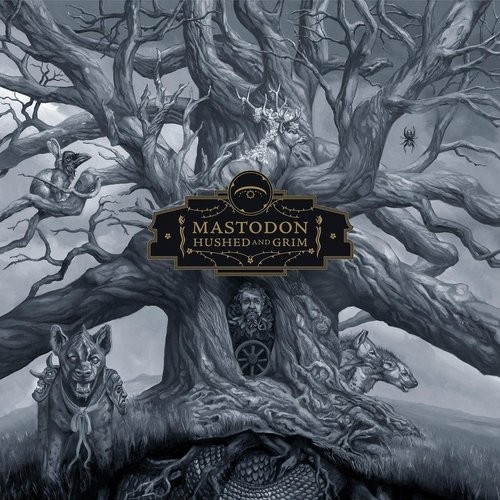
Formed in 2000, Atlanta band Mastodon have released eight studio albums while holding the original recording line-up together (sharing song-writing credits equally probably helps): Troy Sanders (bass and vocals), Brent Hinds (guitar and vocals), Bill Kelliher (guitar and backing vocals), and Brann Dailor (drums and vocals).
Hushed and Grim, their latest release, is an exploration of death and the feelings surrounding it. No strangers to death and dying, their previous releases have taken on the death and illnesses of Mastodon’s family members. Crack the Skye is about Dailor’s sister who committed suicide after extensive bulling by schoolmates. The Hunter is a tribute to Hinds’ brother who died of a heart attack during a hunting trip. Emperor of Sand focuses on a traveller exiled to the desert, but it’s a metaphor for cancer. Sanders’ wife was diagnosed with breast cancer, Dailor’s mother needed chemotherapy, and Kelliher’s mother died from a brain tumour.
The tragic event shaping Hushed and Grim is longtime manager and friend Nick John’s death. In fact, if you look at the cover art, there is a “man in the center of the tree—the heart of the tree—and that is our good friend and manager Nick John,” Dailor explains. Explaining the concept of the artwork and the album, Brann says that it’s a “version of an afterlife mythology.” The idea is that “when you die, your soul inhabits the heart of a living tree. You have to experience the seasons the way that a tree does through a whole calendar year. That’s the way you say goodbye to the natural world” and move on to whatever comes next. In that year, “you reflect on the pillars of the life you lived. You get to atone for things that you’ve done.” The album’s cover is the center—but only a piece—of the larger artwork. If you assemble the complete work from the other squares available in the booklet or look at the entire image online, you can see an eagle at the top of the tree and a serpent at the roots. This is unmistakably a reference the world tree Yggdrasil from Norse mythology. Also, the myth of a person transformed into a tree or some other plant appears in the stories of Narcissus, Hyacinthus, and Daphne. You can loosely track that year of existing in a liminal state as tree from opener “Pain
with an Anchor,” which describes the moment of death, to closer “Gigantium,” which may mark the conclusion of that year and the spirit’s ultimate release.
Like most double albums, there is a lot of variety as the band explores the almost hour-and-a-half-space provided by two records. You get fast, riffing, and stomping songs such as “Savage Lands,” but the album leans more toward mid-tempo. Slower, more contemplative songs like “Had It All” and the eight-and-a-half-minute “Gobblers of Dregs” (both excellent) are on here, too. Two standouts are “More Than I Could Chew” and “Gigantium.” The first fifty seconds of “More Than I Could Chew” are slow and subdued. The next three minutes break out into a riff-fest. The final three minutes form the album’s zenith with just fifteen words: “I have lost my way / reaching for today / Say when / and I’ll coming running back.” Those three minutes are about trying to return to a pivotal moment, a crossroads. There is a sense of nostalgia, regret, and yearning that expresses the feeling of wanting to return to a previous situation, time, or person to change something you did, see that person again or say something to them. You would just do anything you could to get back there. It’s the feeling of having lost someone, and you
miss them so much. You’d go back there if they just wanted you to. All you need is that other person to remember, to forgive, to want it too. Maybe it would only take a word. “Gigantium” is sorrowful but soaring, the sound of regret giving way to acceptance and release. When Mastodon sing “my love, so strong / the mountains we made in the distance / those will stay with us forever,” it seems those lines stand for everyone they’ve ever known who have moved on from this life.
This is Mastodon’s first double album. There’s a cliché about double albums that says every double album would have been better as a single album. Granted we can generally find and rank our favorite songs on any record, but does that mean every double album is inherently inferior to its phantom single-disc version? First, following that logic of less is more, one wonders if every single album would have been better as an EP, every EP better as a single, every five-minute song better as a four-minute song, and so on until we are just listening to half-second blips of noise. Second, if you change the work, it’s no longer the same work. Touchstone double albums such as The Wall, White Album, Electric Ladyland, Physical Graffiti, Exile on Main Street, The Fragile, Bitches Brew—albums so great, I don’t even have to name the artists that made them—are the sum total of all of their songs. Give it all to us, and we’ll sort it out for ourselves. Besides, it’s never been easier to curate personal lists. Reorder, substitute, add, delete, repeat—whatever you want. Before you do too much pruning, though, I’d give every track on Hushed and Grim more than one chance. Pick a spot, branch out, and give this album—all of this album—a chance to grow on you.
TRACKLIST
Disc One:
1. Pain with an Anchor
2. The Crux
3. Sickle and Peace
4. More Than I Could Chew
5. The Beast
6. Skeleton of Splendor
7. Teardrinker
8. Pushing the Tides
Disc Two:
1. Peace and Tranquility
2. Dagger
3. Had It All
4. Savage Lands
5. Gobblers of Dregs
6. Eyes of Serpents
7. Gigantium
